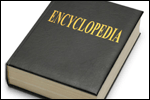 Full multilingual version of the site (500000+ FREE articles)
Full multilingual version of the site (500000+ FREE articles)
 All articles of the Free encyclopedia of electronics and electrical engineering are listed in alphabetical order. For automatic translation of articles into your native language, please use Translate it! form in the top left corner of the page. All articles of the Free encyclopedia of electronics and electrical engineering are listed in alphabetical order. For automatic translation of articles into your native language, please use Translate it! form in the top left corner of the page.
Big Encyclopedia. Food and drinks

 Big Encyclopedia. Food and drinks. Simple answers to difficult questions: Big Encyclopedia. Food and drinks. Simple answers to difficult questions:
 All articles of the section Big Encyclopedia: All articles of the section Big Encyclopedia:
Main Page | Library | Articles | Site Map | Site Reviews

www.diagram.com.ua
2000-2026
|

